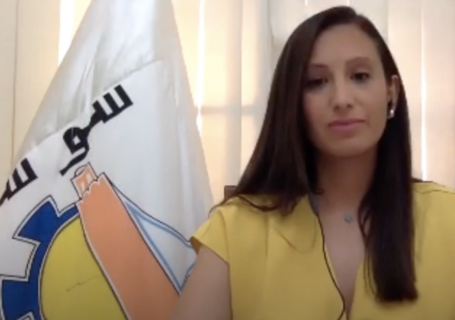
Mobilising stakeholders and CSOs, cooperating with central authorities to develop response plans, making information more accessible. In the framework of the initiative City-to-City Migration Talks featured by Mediterranean City-to-City Migration (MC2CM), project funded by the European Union and co-funded by the Swiss Agency for Development and Cooperation, we have interviewed Imen Ouardani, Vice Mayor of the City of Sousse, to showcase the City’s response to COVID-19 pandemic.
“The municipality of Sousse was both active and proactive when dealing with the pandemic by taking counter measures against the virus before the central government had even acted” said Ouardani, who is also the President of the Commission for Equality and Equal Opportunities between Men and Women. Finding quick and appropriate solutions for its residents has been the priority for the City of Sousse, which has cooperated side by side with regional directorates and local residents to implement measures addressing migrants, refugees and asylum seekers. Coping with an outbreak, in fact, requires both quickness and agility, and this is even more true when vulnerable groups are in danger.
Fine-tuning with the local committee providing social assistance to these publics has been of paramount importance to contain the impact of the pandemic on communities treacherously affected by such a crisis. “In order to protect vulnerable communities, the City of Sousse has launched a comprehensive support programme in synergy with various stakeholders in the region, with the aim of coordinating efforts with the local committee providing social assistance to migrants, refugees and asylum seekers – adds Ouardani –. This committee has pooled its resources to respond to their pressing needs under the slogan Supportive Sousse”. Food packages, financial support, medical and psychological care have been amongst the main measures undertaken.
A considerable effort has been made also in terms of communication. The City of Sousse has chosen not only to publish all relevant information both in French and Arabic, but also to work in synergy with organisations interacting with migrant communities on a daily basis, to overcome language barriers and make information on the COVID-19 crisis more accessible. “Migrants place more trust in their own community, whether that’s in real life or virtually”, suggested Ouardani.
Sousse has been able to mobilise stakeholders and CSOs to meet the needs of migrants but also help in other relevant domains such as the health sector, as well as in monitoring compliance with measures implemented by cities and municipalities. “Demand on health and social services has exceeded their limits, thus jeopardising their ability to provide basic services to vulnerable groups – declared Ouardani –. Associations have played a key role in ensuring our efforts were a success”.
Many lessons learnt, and many projects on the table for the coming months. The City of Sousse would like now to establish an office to welcome and provide information and guidance to migrant communities. To foster cooperation, amongst the initiatives that Sousse would implement there is also a migration monitoring centre, which could gather all active local stakeholders working with migrants. Misinformation and discrimination require a special consideration too, according to Ouardani, as well as “preparing an economic integration strategy for migrants and notably illegal workers” and advocating to find a solution to regularise their residency status in order to enable them to fully integrate into local economic life.
Exchanging and sharing expertise and know-how with other cities of the network has been of the utmost importance to better frame these actions. “The MC2CM project – added Ouardani – has enabled us to enhance and boost communication between cities by sharing good practices and by strengthening our multilevel communication skills, whether vertically or horizontally”.










